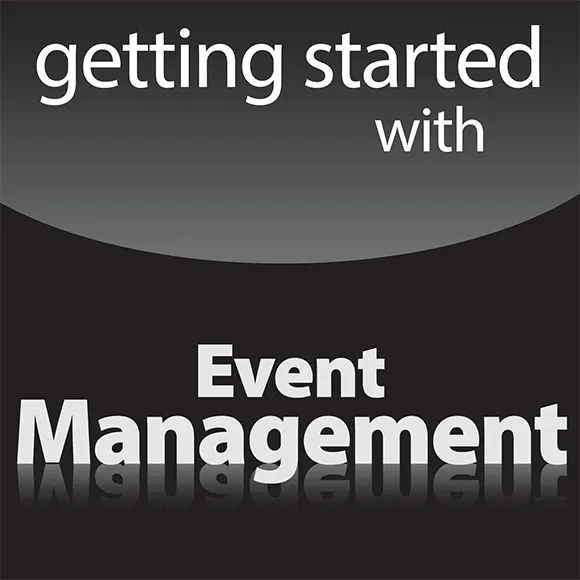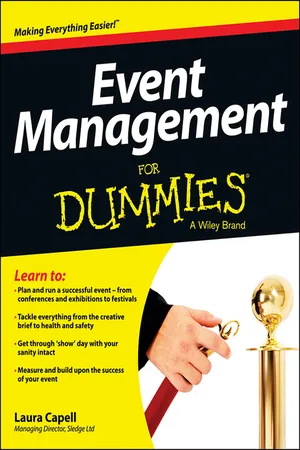Part I
For Dummies can help you get started with a huge range of subjects. Visit
www.dummies.com to learn more and do more with
For Dummies.
In this part . . .
Understand why you’d put on an event in the first place, and why sometimes, face-to-face contact with customers or delegates can achieve so much more than any amount of marketing.
Meet the customers: Learn how to target your event at the right people, and how to get their input.
From conferences to festivals, formal meetings to brand experiences, the range of events is huge. Learn how to choose the right one to meet your client’s brief.
Pull together the perfect planning team. Get the low-down on all the key roles and responsibilities.
Master budgeting and come to terms with costs.
Chapter 1
Why Put on An Event?
In This Chapter
Changes in the industry in recent years
How being organised isn’t the only skill an event manager needs
Establishing why to put on an event
Everyone has a different idea of what event management is and what an event is. There’s no real need to agree; this range of opinions makes the events industry what it is today – diverse.
Whether you’re a wedding planner, fundraiser, secretary, brand manager or even an actual event manager, you can discover a huge amount in this book and from people doing the same things you are. Look around you, see what other people do and try to do it better.
To be successful in the event industry, you need far more than just organisation skills; passion and teamwork are vital, too. This chapter talks you through the skills you need and explores one of the first steps in managing events.
Introducing Events
According to my dictionary, an event is something that takes place – a significant occurrence or happening. I like to think of an event as any particular time when a group of people are brought together.
Many people in the industry don’t consider events to be marketing; they focus on production and creating theatre. I believe, however, that trying to communicate a message to a group of people is a form of marketing. If you think of an event as a marketing tool, what people experience and feel becomes a driving force in your decision making.
The benefits of an event are:
It can be much more personal than other forms of communication.
A real occasion stands out in a cluttered world of digital and above the line marketing (for example, advertising).
People enjoy human interaction and face-to-face conversations.
They generate a high level of word-of-mouth response, which is one of the best forms of endorsement?
Many people consider themselves to be event managers, and many types of event exist. (I cover types of events in more detail in Chapter 3.) As events become more popular, the disparity between what one event manager does and what another does can be huge.
This book focuses on corporate events, while leaving weddings and community events to the more experienced. However, the skills and knowledge are transferrable, and once you’ve mastered how to manage an event, you’ll have the confidence and understanding to manage most events that people can throw at you.
Event Management As an Industry
The UK event industry is now worth more than £36.1 billion, according to the 2010 Britain For Events report – online at www.aceinternational.org/phocadownload/reports/Britain%20for%20Events%20Report%20final.pdf, if you want to take a look. The main event industry sectors are:
Conferences and meetings (£18.8 billion)
Exhibitions and trade shows (£9.3 billion)
Sporting events (£2.3 billion)
Music events (£1.4 billion)
Incentive travel (£1.2 billion)
Festivals and cultural events (£1.1 billion)
Outdoor events (£1 billion)
Corporate hospitality (£1 billion).
That’s a lot of money.
Event industry body Eventia published the 2012 UK Events Market Trends Survey (UKEMTS) in June 2012. This major research project, undertaken annually since 1993, provides volume and key trends data for the UK conference and business events market from a supply-side or venue perspective.
An estimated 103 million delegates attended events in 2011. (An average of 80 people attended each of an estimated 1.3 million events in 2011, slightly more than the average 76 delegates in 2010.)
Eventia reports that a resurgence in corporate sector events accounted for 57 per cent of all events staged (51 per cent in 2010, and just 47 per cent in 2009). The number of association events was stable (21 per cent, the same as in 2010), and public sector events showed a substantial fall, down from 37 per cent in 2009 and 28 per cent in 2010 to 23 per cent in 2011. This industry is growing and growing.
Fifteen years ago, some of the biggest names in the academic marketing industry published Principles of Marketing (by Kotler, Armstrong, Wong and Saunders; Financial Times/Prentice Hall). That book had over 1,000 pages, and one page mentioned events. Now, an Internet search for ‘event management’ generates over 30 million results. This shows how much the marketing industry has changed.
The event management industry has grown hugely in the last five years, in part because of the recession, but also because face-to-face marketing and communications are seen as much more impactful and successful methods than previously. The changes are that:
Production companies that provide kit such as lighting and sound have started to take the extra step of helping to organise other elements of the event too.
PR agencies that were hosting basic press launches and press-worthy stunts have started to try their hand at larger events.
In-house teams have been growing as businesses try to save on costs by not paying other companies to run their events for them.
The London 2012 Olympics was...



































